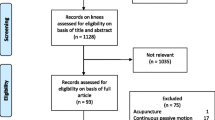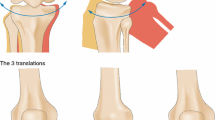Abstract
Background
There is poor correlation between functional outcomes and patient satisfaction following total knee arthroplasty (TKA). We asked if early post-operative scores at 6 months or the pre- to post-operative change in scores are predictive of patient satisfaction 2 years after TKA.
Methods
We conducted a retrospective review of prospectively collected registry data of 4359 TKAs performed at a single institution. At 6 months and 2 years, the Knee Society Score (KSS), Oxford Knee Score (OKS), and Short-Form 36 scores were assessed. A satisfaction questionnaire was also completed. Logistic regression was used to generate receiver-operating characteristic (ROC) curves to assess the ability of each scoring system in predicting satisfaction at 2 years.
Results
At 2 years, 91.1% of patients were satisfied. For the absolute post-operative OKS at 6 months, an AUC of 0.762 (95% CI 0.736–0.788) and a threshold of ≤ 21.5 points (or ≥ 38.5 points on the new scale) were obtained. For the KSS knee score, an AUC of 0.704 (95% CI 0.674–0.734) and a threshold of ≥ 80.5 points were identified. The OKS performed significantly better than the KSS knee score (p = 0.03) and the other post-operative scores (p < 0.001). When analysing the change in scores pre-operatively to 6 months, the AUC was < 0.7 for all scales.
Conclusions
Early post-operative scores, specifically the OKS and KSS knee score, can predict patient satisfaction at 2 years after TKA with good accuracy. The threshold values offer surgeons an additional tool to identify patients at risk of dissatisfaction at 2 years, enabling them to intervene earlier to ensure good patient satisfaction.
Level of evidence
III, retrospective cohort study



Similar content being viewed by others
References
Ahmad SS, Meyer JC, Krismer AM, Ahmad SS, Evangelopoulos DS, Hoppe S, Kohl S (2017) Outcome measures in clinical ACL studies: an analysis of highly cited level I trials. Knee Surg Sports Traumatol Arthrosc 25:1517–1527
Antoniadis A, Dimitriou D, Canciani JP, Helmy N (2019) A novel preoperative scoring system for the indication of unicompartmental knee arthroplasty, as predictor of clinical outcome and satisfaction. Arch Orthop Trauma Surg 139:113–120
Baker PN, van der Meulen JH, Lewsey J, Gregg PJ (2007) The role of pain and function in determining patient satisfaction after total knee replacement: data from the National Joint Registry for England and Wales. J Bone Jt Surg Br 89-B:893–900
Baker PN, Rushton S, Jameson SS, Reed M, Gregg P, Deehan DJ (2013) Patient satisfaction with total knee replacement cannot be predicted from pre-operative variables alone. Bone Jt J Br Editor Soc Bone Jt Surg 95-B:1359–1365
Baumann C, Rat AC, Osnowycz G, Mainard D, Delagoutte JP, Cuny C, Guillemin F (2006) Do clinical presentation and pre-operative quality of life predict satisfaction with care after total hip or knee replacement? J Bone Joint Surg Br 88-B:366–373
Brander V, Gondek S, Martin E, Stulberg SD (2007) Pain and depression influence outcome 5 years after knee replacement surgery. Clin Orthop 464:21–26
Brander VA, Stulberg SD, Adams AD, Harden RN, Bruehl S, Stanos SP, Houle T (2003) Ranawat award paper: predicting total knee replacement pain: a prospective, observational study. Clin Orthop 416:27–36
Bullens PHJ, van Loon CJM, de Waal Malefijt MC, Laan RFJM, Veth RPH (2001) Patient satisfaction after total knee arthroplasty. J Arthroplasty 16:740–747
Clement ND, Macdonald D, Burnett R (2013) Predicting patient satisfaction using the Oxford knee score: where do we draw the line? Arch Orthop Trauma Surg Springer Sci Bus Media LLC 133:689–694
Dorr LD, Chao L (2007) The emotional state of the patient after total hip and knee arthroplasty. Clin Orthop Ovid Technologies (Wolters Kluwer Health) PAP 463:7–12
Escalante A, Beardmore T (1997) Predicting length of stay after hip or knee replacement for rheumatoid arthritis. J Rheumatol 24:146–152
Ethgen O, Bruyère O, Richy F, Dardennes C, Reginster J-Y (2004) Health-related quality of life in total hip and total knee arthroplasty: a qualitative and systematic review of the literature. J Bone Jt Surg 86:963–974
Fortin PR, Clarke AE, Joseph L, Liang MH, Tanzer M, Ferland D, Phillips CB, Partridge AJ, Belisle P, Fossel AH, Mahomed NN, Sledge CB, Katz JN (1999) Outcomes of total hip and knee replacement: preoperative functional status predicts outcomes at six months after surgery. Arthritis Rheum 42:1722–1728
Fortin PR, Penrod JR, Clarke AE, St-Pierre Y, Joseph L, Bélisle P, Liang MH, Ferland D, Phillips CB, Mahomed N, Tanzer M, Sledge C, Fossel AH, Katz JN (2002) Timing of total joint replacement affects clinical outcomes among patients with osteoarthritis of the hip or knee: timing of total joint replacement in OA. Arthritis Rheum 46:3327–3330
Gandhi R, Dhotar H, Razak F, Tso P, Davey JR, Mahomed NN (2010) Predicting the longer term outcomes of total knee arthroplasty. Knee 17:15–18
Goh GS, Liow MHL, Chen JY, Tay DK-J, Lo N-N, Yeo S-J (2020) Can octogenarians undergoing total knee arthroplasty experience similar functional outcomes, quality of life, and satisfaction rates as their younger counterparts? A propensity score matched analysis of 1188 patients. J Arthroplasty 35(7):1833–1839. https://doi.org/10.1016/j.arth.2020.02.033
Goh GS, Liow MHL, Chen JY, Tay DK-J, Lo N-N, Yeo S-J (2020) Do patients with psychological distress have poorer patient-reported outcomes after total hip arthroplasty? J Arthroplasty 35(9):2465–2471. https://doi.org/10.1016/j.arth.2020.04.077
Goh GS, Liow MHL, Tay YWA, Chen JY, Xu S, Pang H-N, Tay DK-J, Chia S-L, Lo N-N, Yeo S-J (2020) The long-term impact of preoperative psychological distress on functional outcomes, quality of life, and patient satisfaction after total knee arthroplasty: a ten-year follow-up study. Bone Jt J 102-B:845–851
Goh GS, Zeng GJ, Chen JY, Lo N-N, Yeo S-J, Liow MHL (2020) Ten-year results of unicompartmental knee arthroplasty in patients with psychological distress. J Arthroplasty 35(10):2830–2836. https://doi.org/10.1016/j.arth.2020.05.011
Goh GS-H, Liow MHL, Bin Abd Razak HR, Tay DK-J, Lo N-N, Yeo S-J (2017) Patient-reported outcomes, quality of life, and satisfaction rates in young patients aged 50 years or younger after total knee arthroplasty. J Arthroplasty 32:419–425
Grant SW, Hickey GL, Dimarakis I, Trivedi U, Bryan A, Treasure T, Cooper G, Pagano D, Buchan I, Bridgewater B (2012) How does EuroSCORE II perform in UK cardiac surgery; an analysis of 23,740 patients from the Society for Cardiothoracic Surgery in Great Britain and Ireland National Database. Heart BMJ 98:1568–1572
Janse AJ, Gemke RJ, Uiterwaal CS, van der Tweel I, Kimpen JL, Sinnema G (2004) Quality of life: patients and doctors don’t always agree: a meta-analysis. J Clin Epidemiol 57:653–661
Judge A, Arden NK, Price A, Glyn-Jones S, Beard D, Carr AJ, Dawson J, Fitzpatrick R, Field RE (2011) Assessing patients for joint replacement. J Bone Jt Surg Br Editor Soc Bone Jt Surg 93-B:1660–1664
Kim TK, Chang CB, Kang YG, Kim SJ, Seong SC (2009) Causes and predictors of patient dissatisfaction after uncomplicated total knee arthroplasty. J Arthroplasty 24:263–271
Klit J, Jacobsen S, Rosenlund S, Sonne-Holm S, Troelsen A (2014) Total knee arthroplasty in younger patients evaluated by alternative outcome measures. J Arthroplasty 29:912–917
Kogon B, Oster M (2014) Assessing surgical risk for adults with congenital heart disease: Are pediatric scoring systems appropriate? J Thorac Cardiovasc Surg Elsevier BV 147:666–671
Kwon SK, Kang YG, Kim SJ, Chang CB, Seong SC, Kim TK (2010) Correlations between commonly used clinical outcome scales and patient satisfaction after total knee arthroplasty. J Arthroplasty Elsevier BV 25:1125–1130
Lingard EA, Katz JN, Wright EA, Sledge CB (2004) Predicting the outcome of total knee arthroplasty. J Bone Jt Surg 86:2179–2186
Lundblad H, Kreicbergs A, Jansson K (2008) Prediction of persistent pain after total knee replacement for osteoarthritis. J Bone Jt Surg Br Editor Soc Bone Jt Surg 90-B:166–171
Mahdi A, Hälleberg-Nyman M, Wretenberg P (2020) Preoperative psychological distress no reason to delay total knee arthroplasty: a register-based prospective cohort study of 458 patients. Arch Orthop Trauma Surg. https://doi.org/10.1007/s00402-020-03537-w
Nilsdotter AK, Toksvig-Larsen S, Roos EM (2009) Knee arthroplasty: are patients’ expectations fulfilled?: a prospective study of pain and function in 102 patients with 5 year follow-up. Acta Orthop 80:55–61
Noble PC, Conditt MA, Cook KF, Mathis KB (2006) The John insall award: patient expectations affect satisfaction with total knee arthroplasty. Clin Orthop 452:35–43
Razmjou H, Yee A, Ford M, Finkelstein JA (2006) Response shift in outcome assessment in patients undergoing total knee arthroplasty. J Bone Jt Surg Ovid Technologies (Wolters Kluwer Health) 88:2590–2595
Robertsson O, Dunbar M, Pehrsson T, Knutson K, Lidgren L (2000) Patient satisfaction after knee arthroplasty: a report on 27,372 knees operated on between 1981 and 1995 in Sweden. Acta Orthop Scand Informa UK Limited 71:262–267
Robertsson O, Dunbar MJ (2001) Patient satisfaction compared with general health and disease-specific questionnaires in knee arthroplasty patients. J Arthroplasty 16:476–482
Rothwell PM, McDowell Z, Wong CK, Dorman PJ (1997) Doctors and patients don’t agree: cross sectional study of patients’ and doctors’ perceptions and assessments of disability in multiple sclerosis. BMJ 314:1580–1580
Scott CEH, Howie CR, MacDonald D, Biant LC (2010) Predicting dissatisfaction following total knee replacement. J Bone Joint Surg Br 92-B:1253–1258
Singh JA, O’Byrne MM, Colligan RC, Lewallen DG (2010) Pessimistic explanatory style. J Bone Joint Surg Br British Editorial Society of Bone Joint Surgery 92-B:799–806
Ware JE, Kosinski M, Bayliss MS, McHorney CA, Rogers WH, Raczek A (1995) Comparison of methods for the scoring and statistical analysis of SF-36 health profile and summary measures: summary of results from the Medical Outcomes Study. Med Care 33:AS264–AS279
Weiss JM, Noble PC, Conditt MA, Kohl HW, Roberts S, Cook KF, Gordon MJ, Mathis KB (2002) What functional activities are important to patients with knee replacements? Clin Orthop 404:172–188
Funding
This research received no specific grant from any funding agency in the public, commercial, or not-for-profit sectors.
Author information
Authors and Affiliations
Corresponding author
Ethics declarations
Conflict of interest
The authors declare that they have no conflict of interest.
Ethical approval
Centralised institutional review board (IRB) approval (CIRB 2018/2386) was obtained for this study.
Informed consent
Informed consent was obtained from all individual participants include in the study.
Additional information
Publisher's Note
Springer Nature remains neutral with regard to jurisdictional claims in published maps and institutional affiliations.
This work was performed at Singapore General Hospital, Singapore.
Rights and permissions
About this article
Cite this article
Goh, G.S., Bin Abd Razak, H.R., Tay, D.KJ. et al. Early post-operative oxford knee score and knee society score predict patient satisfaction 2 years after total knee arthroplasty. Arch Orthop Trauma Surg 141, 129–137 (2021). https://doi.org/10.1007/s00402-020-03612-2
Received:
Accepted:
Published:
Issue Date:
DOI: https://doi.org/10.1007/s00402-020-03612-2




